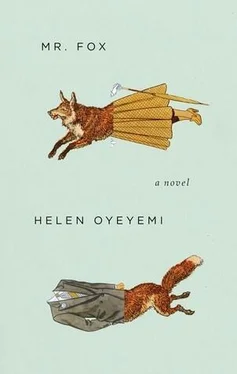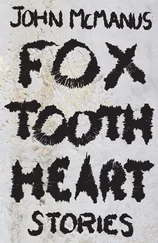I ignored my agent’s phone calls and deleted the threats he left me via voice mail — I was smiling in a way that felt new, so fresh it was like another face, and I didn’t want to stop. Not even for the moment needed to take one of those pictures people said were so good, the ones in which a girl with blank and shiny eyes stood on one leg, looked over her shoulder, was an acrobat, was no one.
The day S.J. went back to work I dashed around Brier Moss, buying things to cook for a dinner party in the evening. He wanted me to meet some of his friends. Two female friends and two male friends. They were all single, so he was also hoping to set them up. I bought candles and flowers and artichokes and steak and braced myself for a frosty reception from the single female friends. It wasn’t unlikely that they had stayed single in the hopes that he might suddenly fall for them. When I came back from town I went into S.J.’s study to fetch a cookbook. He’d left the French doors open, and in going to close them, I almost trod on a finch. The bird lay on its back in between the doors and didn’t take fright at my drawing so near. Its beak and feet pointed at the sky, blackened, as if blasted by flame. It had died with its eyes open and some liquid in them congealing. And there were more just outside. I stopped counting after ten. They were all in the same condition. There were more birds chirping from somewhere, there were still birds, still singing, but I couldn’t see them. They must be very high up. For a moment I thought I’d be sick, but I wasn’t sick. The majority of the bodies were congregated in an uneven half-ring around the cedar tree. Oh. . My eyes flickered closed — for a moment I saw myself standing on the grass, cake flowing from my hand like sand — my eyes opened again. I used a rolled-up magazine to push the bodies towards each other, into a heap. I wanted to dig, so that I could bury them, but I had nothing to dig with. I tried a little with my hands, and it took a long time to make even the slightest pocket in the ground. I had to cook the food; I had to get ready for guests. I didn’t want people to arrive and find me here, scrabbling in the earth with my fingernails. I just had to leave the birds where they were.
I went into the kitchen and stood beside the Aga staring at the wall. It was on; it had been on all morning. I’d laughed at it when I first saw it, but it gave off serious warmth. Dinner would be ready, possibly even burnt, in no time. And then I would have nothing to do.
I think I’m going to have to go.
I grasped gratefully at that thought. I became busy. I chopped the steak and made a marinade for the artichokes. I closed the kitchen door and lined the bottom of it with tea towels. I opened the oven door and knelt down and breathed blue, dancing gas. I coughed but without urgency. I was dizzy, and the heat around me was not unpleasant; it was like being lost in a fog when you had nowhere in particular to go. It didn’t matter. I collapsed onto my stomach and looked to the side, not that there was anything to see, apart from grey-coated metal.
I began to choke. I couldn’t move. I wanted to, but my head wouldn’t do it — the fog was in it.
I heard a distant sound — a dial turning.
The Aga shut down. No more blue, just gaping blackness.
Someone was crouching near me. She put her hand on my leg. My skin shrieked. I can’t explain how it felt. There was movement beneath her fingernails.
“You’re an idiot,” she said. Her voice wasn’t at all the way I’d imagined it. It was clear and firm.
“Nothing’s wrong here. Can’t you see that? Nothing’s wrong. Next time just don’t feed the birds with cake that’s been experimentally laced with pharmaceuticals. You listen to me, Mary Foxe, or whatever your name is. Stay here. There’s a decent man here who will probably fall for you if you don’t make a mess of things. He’ll take care of you. And you take care of him. No point having any more death.”
My mother. My father. I couldn’t speak.
“Yes,” she said. “I know. But you’re what happens next. That’s all I wanted to tell you upstairs, but you ran like — like the hound of the Baskervilles or something.”
“Thank you, Daphne,” I whispered.
“Oh, yes, you owe me one. So you’ll tell him?”
“Tell him what?”
“That it’s not his fault about me. Because it’s not.”
“I’ll tell him.”
“Don’t just say it. Make him believe it.”
“How—”
“Make him believe it.” She squeezed my ankle.
“I will!”
“I’m tired,” she said. “I’m going now. Be bad. Be wicked. And you should worry. But don’t.”
Mary stayed out of my way for a couple of weeks. I was busy with Daphne, trying to get her to like me again and call off the death threats from her friends. I began teaching Daphne to drive. She was fearless — a little too fearless for my taste — and she learnt fast. She’d bought a pair of driving gloves specially, and her hands rested serenely on the wheel when it was her turn to try taking a corner. We drove down to the pheasant farm I used to shoot at when I was coming up — fifteen minutes away, but it took us thirty-five with Daphne driving. She brought a pheasant back with us and cooked it up for dinner — it was the worst meal I’d ever encountered, but I choked it down and appreciated it. She was trying, and I was trying. It’d be wrong to say my wife hasn’t got any go in her. On our honeymoon she spent the best part of a morning leaping around a rock garden, bouncing from ledge to ledge like a lunatic and singing some almost offensively sugary song. She slipped and twisted her ankle, but she didn’t howl about it. She bit her lip and she cried a little, because, she said, she didn’t want to pretend it didn’t hurt. And she hobbled around good-humouredly, taking snapshots and studying the gaudy little paintings for sale on the streets just as solemnly as if they were up in a gallery. Remembering that she’d cried, I got a doctor to look at her ankle for her when we got back to the hotel. It was a sprain. I’d have understood if she’d howled.
Another day we drove down to the state park. It’s called Devil’s Hopyard. That was a pretty good afternoon. Close to the waterfall each tree quivers as if trying to shake itself awake from a bad dream without waking the others up. And the stones all around the waterfall itself are half hollowed out — we looked at stone after stone for almost an hour. The hollows were definite, as if someone had come along with a scoop and removed the heart of each stone.
“These are the reason this place is called Devil’s Hopyard,” I told Daphne. “People round here used to say the devil himself made the marks in the stones with his hooves as he walked over them. . ”
“It’s the only explanation,” Daphne said solemnly. I found myself playing with her hair — just sort of mussing it and walking my fingers down the strands until they fell back into place again.
“How’s Mary?” she asked me, almost straight-faced. Almost.
“Mary who?” I asked.
That night, after love, she rolled away from me and sat up in her own bed. I was falling asleep, but she sat in a way that demanded I look at her. She had her hand on the top of her head, as if trying to keep something in.
“What is it?” I asked. I stretched out an arm. “Come back!” She stayed where she was.
“I’ve just got to go and — you know.” She was whispering, as if she didn’t want to be overheard. Even though we were the only ones in the house.
“Oh — okay, honey. Good thing you remembered.” Daphne sponged with Lysol disinfectant to keep from getting pregnant. It worked, too. She hadn’t wanted a kid when we got married, and I hadn’t argued.
Читать дальше












